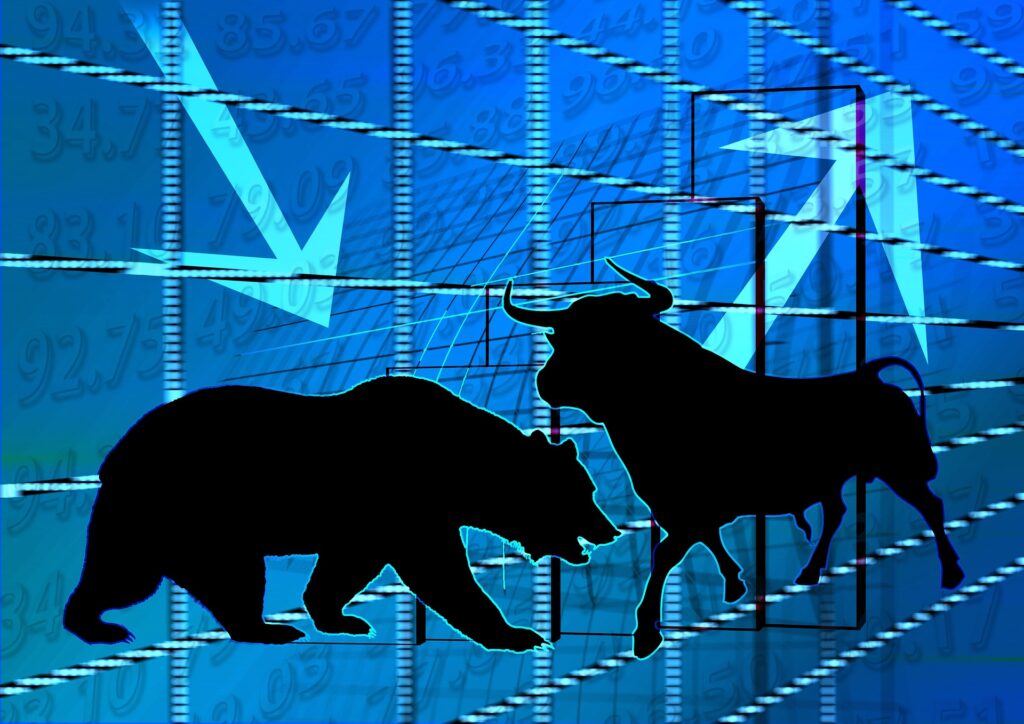 Many Americans are invested in (have money in) the stock market, especially for their retirement (when they stop working).
Many Americans are invested in (have money in) the stock market, especially for their retirement (when they stop working).
A stock is part-ownership in a company. A stock market is a place where you can buy and sell stocks.
Companies that want to raise (collect; bring together) money can offer part ownership in their company by selling shares (individual pieces of) of stock.
In the past several months, the stock market in the U.S. has been very volatile (unpredictable; difficult to know what will happen next).
When the stock market is doing poorly, stock traders call that a “bear market.” (A bear is a large animal that walks on two or four legs and has thick fur (hair).)
There are other commonly-used terms to talk about a falling (losing money) market, including “downturn,” “plunge/dive,” and “crash.”
A downturn is a slow drop or decline in the economy (the wealth or resources of a country).
For example: “The current housing market downturn is making homes more affordable (easier to buy).”
When stock prices plunge or take a dive, they drop a lot. Both “plunge” and “take a dive” are actually swimming expressions.
A “plunge” is any quick drop into the water, while a “dive” is quick jump head first into the water, usually with your arms raised above your head.
So we could say, “The tech company’s stock plunged/took a dive when the company announced its poor sales figures (numbers).”
But when stock market prices drop very suddenly and by a lot, that’s called a crash.
The most famous stock market crash in the U.S. was in 1929 and it led to the Great Depression (see Cultural English 327).
When the stock market is doing well, stock traders call that a “bull market.” (A bull is a male cow, usually with horns.)
You can also use the terms “uptick,” “rally,” and “boom” to describe the market when it’s doing well.
If stock prices go up a little bit, we say that there is an “uptick in prices” or an “uptick in the market.”
When prices go up quickly and by a lot, we would call that a “rally.” Usually, rallies last a short time: minutes, hours, or even a few days.
But when rallies last a long time, we call that a stock market “boom.”
Note that we can have “boom” in other parts of the economy, too. When an individual company is experiencing a boom, it means that their sales are high, they are selling a lot of their product or services.
Even a country can have a boom, meaning that many sectors or areas of a country’s economy are doing very well.
No one knows where the current volatile stock market is headed (where it will go), so if you have money in the stock market, get ready for a wild ride (unpredictable journey with a lot of ups and downs)!
~Jeff
P.S. For more information on stock markets, check out some of our Daily English lessons as part of our Unlimited English Membership:
Daily English 276 – The Stock Market
Daily English 1048 – Launching an Initial Public Offering
Cultural English 224 – NY Stock Exchange
P.P.S. Like this short English lesson? Get a FREE sample lesson (no money needed) – SIGN UP BELOW!
Just fill out the form below and we’ll send a FREE lesson to try!
We hate spam, too! We will never sell, rent, or give your information to anyone – ever!
What Will I Learn in My Free Lesson?
Here is just a small part of what you’re going to learn in this free lesson:
- What “take a rain check” means and how to use it in a conversation . . .
- The difference between a “recluse” and a “busybody” . . .
- Why “to fend OFF” means something from “to fend FOR” . . .
- What it means to “take a rain check,” “keep to yourself,” and “to appoint (someone)” . . .
- What a social secretary is . . .
- The best way to use “to sort out” and “to turn down” . . .
- How to use phrasal verbs like “to settle in” and “to settle down” (they’re not the same!) . . .